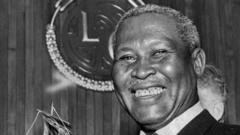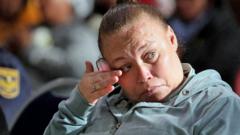After decades of questioning the official narrative surrounding Chief Albert Luthuli's death, South Africa's justice system is set to conduct a new investigation. His family and activists are eager for transparency over the events leading to his tragic demise in 1967, fueling ongoing debates about historical accountability.
South Africa to Revisit Chief Albert Luthuli's Death in New Inquest

South Africa to Revisit Chief Albert Luthuli's Death in New Inquest
The South African court is reopening the inquest into Chief Albert Luthuli’s death, a renowned anti-apartheid leader and Nobel laureate, amid longstanding suspicion of foul play.
A South African court is set to reopen the inquiry into the death of Chief Albert Luthuli, a significant figure in the fight against apartheid and a recipient of the Nobel Peace Prize in 1960. Originally deemed accidental, Luthuli allegedly died after being struck by a train while walking on a railway line, according to a 1967 inquest. However, this explanation has long been met with skepticism from his relatives and activists, prompting calls for a thorough reassessment.
Luthuli led the African National Congress (ANC) during a time when political involvement was heavily restricted, and he had been under immense pressure from the apartheid regime. His grandson, Albert Mthunzi Luthuli, expressed gratitude for the reopening of the case, arguing that previous inquiries, particularly the Truth and Reconciliation Commission (TRC), inadequately addressed the injustices faced by many families in South Africa.
The National Prosecuting Authority (NPA) has announced their intention to bring forth new evidence to challenge the findings of the original inquest, although details regarding this evidence have not yet been disclosed. The NPA stated that the earlier investigation concluded there was "no evidence of criminal culpability" from the South African Railways or any individuals involved.
Luthuli's death remains emblematic of a broader struggle for justice within South Africa's history, where many anti-apartheid heroes faced violent ends. Luthuli was the first South African to receive the Nobel Peace Prize, joining a select group of other prominent figures awarded later, including Nelson Mandela and Desmond Tutu.
On the same day, another inquest concerning the murder of anti-apartheid lawyer Mlungisi Griffiths Mxenge is also being revisited. Mxenge was brutally killed in 1981, and while some justice has been served, reopening this case highlights the ongoing quest to confront South Africa's painful past. Recent developments suggest that new evidence may shed light on previously undisclosed facets of such cases, driving home the importance of accountability in the nation's ongoing healing process.



















